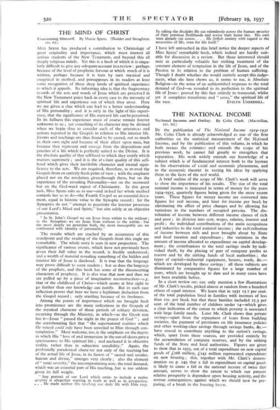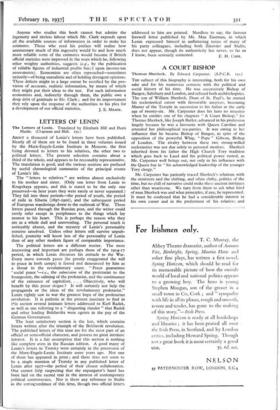THE NATIONAL INCOME
BY the publication of The National Income 1924-1931 Mr. Colin Clark is already acknowledged as one of the first authorities on the statistical measurement of the National Income, and by the publication of this volume, in which he both revises the estimates and extends the scope of his previous work, he cannot fail greatly to strengthen that reputation. His work widely extends our knowledge of a subject which is of fundamental interest both to the layman in his observations of sacial and economic phenomena, and to the economic theorist in testing his ideas by applying them to the facts of the real world.
A brief outline of the scope of Mr. Clark's work will serve to show the importance of his results. The size of the total national income is measured in terms of money for the years 1924-1935, quarterly figures being given for the more recent years. These figures for money income are converted into figures for real income, and later for income per head, by eliminating the effect of price changes and by allowing for variations in the numbers of occupied persons. The dis- tribution of income between different income classes of rich and poor ; its division into rent, wages, salaries, interest and profit ; the individual contributions of the main occupations and industries to the total national income ; the redistribution of income between rich and poor brought about by State and local taxation and expenditure ; the variations in the amount of income allocated to expenditure on capital develop- ment; the contributions to the total savings made by indi- vidual thrift, by the placing of part of company profits to reserve and by the sinking funds of local authorities ; the types of capital—industrial equipment, houses, roads, &c.— which are developed by these savings : all these subjects are illuminated by comparative figures for a large number of years, which are brought up to date and in many cases have not been available before.
• In a short review on can only mention a few illustrations of Mr. Clark's results, picked almost at random from a hundred others of equal interest. We learn that in 1931 13.7 per cent. of the total population lived in families with incomes of less than los. per head, but that these families included 25.3 per cent, of the total number of children under 14—which gives a clear indication of the extent to which poverty is associated with large family needs. Later Mr. Clark shows that private savings—apart from the repayment of loans from building societies, the payment of premiums on life insurance policies and other working-class savings through savings banks, &c.— have ceased to contribute anything to the nation's savings, which, apart from these sources, are provided entirely by the accumulation of company reserves, and by the sinking funds of the State and local authorities. Figures are given to show that in 1935, out of a total expenditure on new capital goods of £268 million, £145 million represented expenditure on new housing ; this, together with Mr. Clark's demon- stration on p. 249 that a fall in expenditure on capital goods is likely to cause a fall in the national income of twice that amount, serves to show the extent to which our present relative prosperity is dependent upon housing activity, and the serious consequences, against which we should now be pre- paring, of a break in the housing bown. Anyone who studies this book cannot -but admire the ingenuity and tireless labour which Mr. Clark expends upon all the available sources of information in order to make his estimates. Those who read his preface will realise how unnecessary much of this ingenuity wciuld be and how much more reliable some of the estimates would become if British official statistics were improved in the ways which he, following other weighty authorities, suggests (e.g., by the publication of reliable figures of industrial • profits baszd upon income-tax assessments). Economists are often reproached—sometimes unjustly—of being unrealistic and of holding divergent opinions. -These defects might to a large extent be rectified by the pro- vision of accurate, realistic information, by means of which they might put their ideas to the test. For such information economists and, indirectly through them, the public owe a deep debt of gratitude to Mr. Clark ; and for its improvement they rely upon the response of the authorities to his plea for a development of our official statistics. J. E. MEADE.















































 Previous page
Previous page